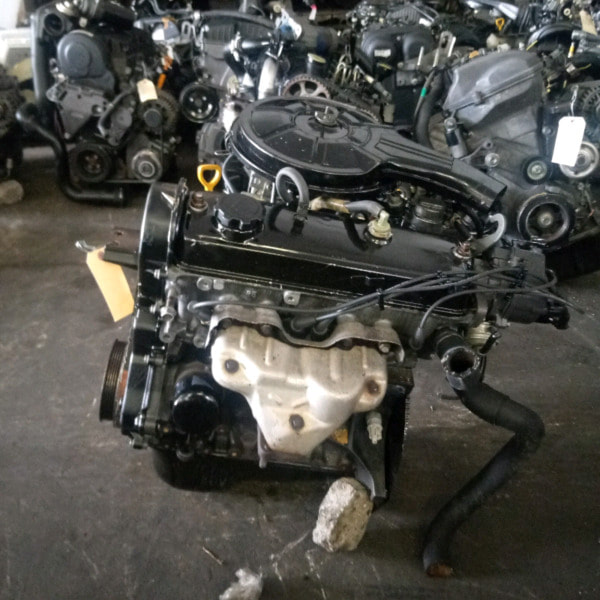Open Performance: Toyota Tazz Engine for Sale at Affordable Rates
Open Performance: Toyota Tazz Engine for Sale at Affordable Rates
Blog Article
Engine Buying Expert Tips on Choosing the Right Engine for Your Details Needs
Selecting the right engine for your details demands involves a complicated interplay of aspects that go beyond simple horse power numbers. From power result to sustain efficiency, the decision-making process can be discouraging. Recognizing the subtleties of engine kinds, dimensions, and their compatibility with your lorry is crucial. There are skilled ideas that can assist browse this terrain with self-confidence. By diving right into the intricacies of power versus effectiveness, examining gas scores, and budgeting for lasting expenses, one can absolutely maximize their engine choice.
Power Vs. Performance: Discovering the Balance
When picking an engine, it is crucial to strike a balance in between power and effectiveness to meet your certain demands efficiently. Power describes the engine's capacity to create energy for propulsion, identifying aspects like velocity, hauling ability, and total efficiency (Toyota Tazz Engine For Sale). On the various other hand, effectiveness relates to exactly how well the engine uses gas to produce power, impacting factors such as gas economy and ecological friendliness
Attaining the best equilibrium between power and performance is important since an engine that is also powerful may consume extreme fuel, resulting in greater operating expense and unnecessary pressure on the setting. On the other hand, an engine that prioritizes efficiency over power might cause slow-moving performance, especially sought after situations like towing heavy lots or driving uphill.
To make an educated choice, think about variables such as your common driving problems, the designated use the car, and your individual preferences. By reviewing your needs and priorities, you can select an engine that strikes the ideal equilibrium in between power and performance, guaranteeing optimum performance while reducing environmental effect and operating expense.
Comprehending Engine Size and Kind

Furthermore, engine type plays a vital function in determining the performance attributes of an engine. Common engine types include inline engines, V engines, and rotary engines, each with its one-of-a-kind benefits and drawbacks. The engine type impacts variables such as the engine's size, weight circulation, and power delivery. Understanding the interaction in between engine dimension and kind is crucial in selecting an engine that aligns with your specific demands and priorities, whether it be power, visit homepage effectiveness, or an equilibrium of both.
Consider Your Lorry's Needs
If you are looking for an engine for a durable truck that will be made use of for towing, you will certainly require an effective engine with high torque abilities. On the other hand, if you are picking an engine for a small vehicle largely utilized for city travelling, fuel efficiency may be an extra vital element to take into consideration.

Reviewing Gas Performance Ratings
Evaluating gas efficiency scores is a crucial facet of choosing the appropriate engine for your automobile, ensuring cost financial savings and ecological sustainability. Gas effectiveness ratings, usually gauged in miles per gallon (MPG) for fuel engines or kilowatt-hours per 100 miles (kWh/100 miles) for electrical engines, show just how far a car can take a trip on a details quantity of gas or electrical power. Greater MPG or reduced kWh/100 miles values indicate extra efficient engines, equating to reduced fuel costs and lower carbon exhausts.
When assessing gas effectiveness scores, consider your driving requirements and practices. If you commute fars away daily, an extremely fuel-efficient engine can cause substantial savings gradually. In addition, compare different engine choices within the exact same vehicle class to identify one of the most affordable choice. Factors such as engine dimension, weight, aerodynamics, and crossbreed or electric abilities can all affect fuel effectiveness.
Budgeting for Long-Term Costs
Purposefully planning for lasting costs is vital when selecting an engine, making sure financial sustainability over the car's lifespan. While the preliminary acquisition cost of an engine is a considerable element, it is vital to consider the long-lasting prices linked with maintenance, repair services, and gas intake.
Furthermore, researching the schedule and price of replacement components for the picked engine is vital in budget planning. By carefully budgeting for these long-lasting expenses and factoring them right into the decision-making procedure, people can pick an engine that not only satisfies their immediate demands check out this site but likewise stays cost-efficient throughout its lifespan.
Conclusion
To conclude, choosing the ideal engine for your details needs requires stabilizing power and effectiveness, recognizing engine size and type, considering your lorry's demands, assessing gas performance ratings, and budgeting for long-lasting expenses. By thoroughly taking into consideration these factors, you can make sure that you select an engine that fulfills your needs and gives ideal performance for your automobile.
To further improve the option procedure of an engine that strikes the optimum equilibrium in between power and efficiency, it is necessary to dig right into the ins and outs of comprehending engine size and type. Engine size refers to the overall quantity of air and fuel that can be pushed via the engine cylinders. Typical engine types include inline engines, V engines, and rotating engines, each with its special advantages and downsides. Understanding the interaction between engine dimension and kind is essential in choosing an engine that lines up with your specific requirements and top priorities, whether it be power, efficiency, or an equilibrium of both.
Gas performance ratings, commonly determined in miles per gallon (MPG) for gasoline engines or kilowatt-hours per 100 miles (kWh/100 miles) for electrical engines, show just how much a vehicle can travel on a specific quantity of fuel or electrical power.
Report this page